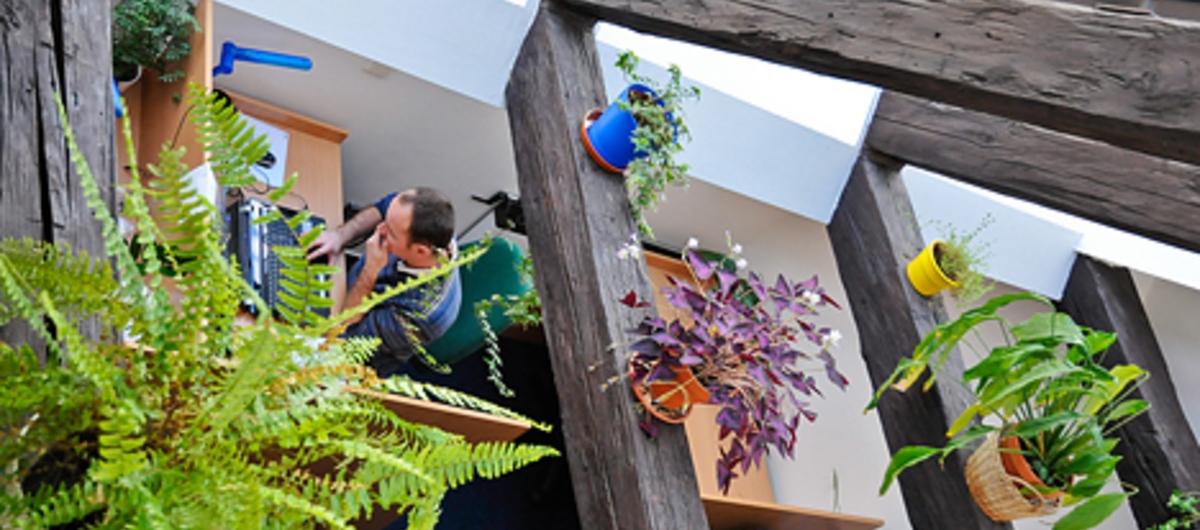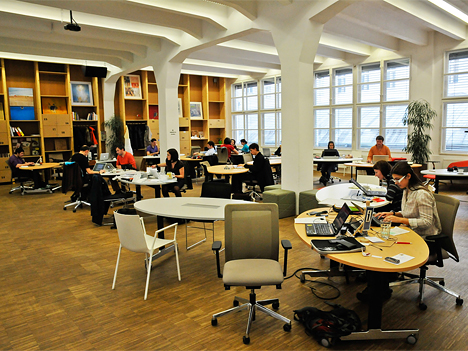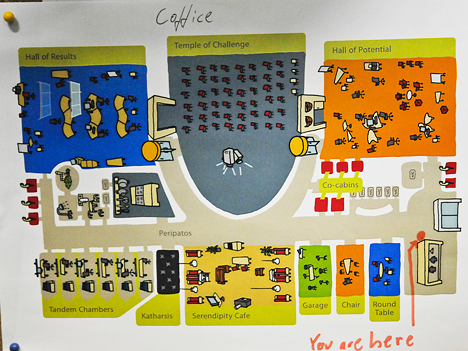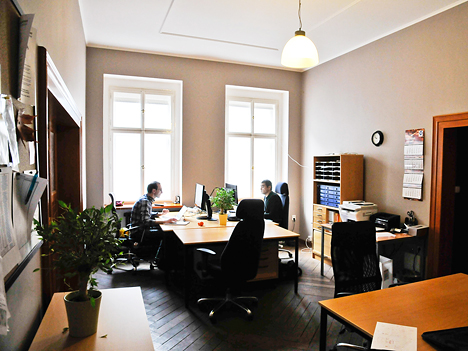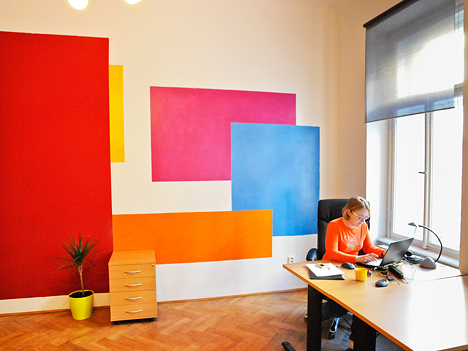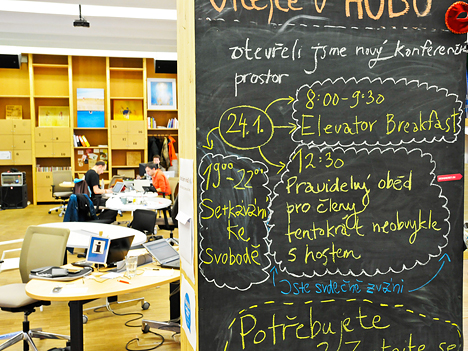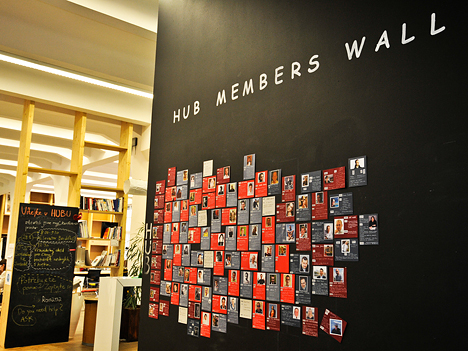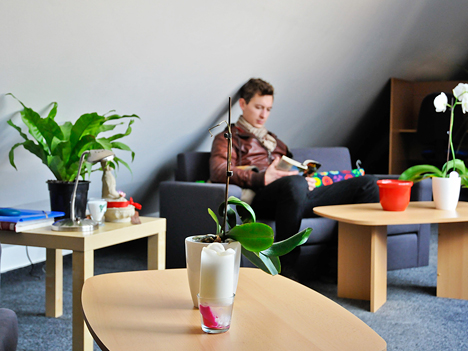The situation for coworking in the Czech Republic is paradoxical. With the deeper integration into the European Union, the economy is moving towards more capitalist ideals. This has presented new opportunities for business growth, and consequently for freelancers and entrepreneurs, for whom coworking is designed. However, the social repercussions of a succession of rigid regimes and long Communist rule has made individuals wary of collaboration and sharing resources.
Paul Wehle, who took over from David Ostr?il who founded Coffice, Prague's first coworking space, feels that for many Czechs, working in such an open environment is a strange concept. This is perhaps a different experience for coworking space operators in, for example, Western Europe. Nonetheless, Wehle notices a boom in the movement, with an increasing number of members in all spaces and a lot of new faces popping in to see what coworking looks like.
Coffice opened its doors in November 2009, marking the commencement of the coworking movement in Prague. Occupying the first floor of a centrally located building, coworkers sit in workspaces overlooking a pretty square, their workstations bathed in morning sun. It is a warm, calm environment without the social buzz of other larger spaces, but which works well for the ten members it houses. The meeting room, complete with plush leather couches, serves as a space for public language courses and contributes to the monthly turnover.
Since Coffice opened, six more spaces have joined the coworking movement, the number set to rise: at the time of writing, by Spring, two additional spaces will open in the same building which is home to the Hub Praha, including one dedicated to new technology. Most of the spaces in Prague are less than 12 months old.
Connection instead of rivalry
For a city of 1.2 million inhabitants, the number is healthy, though falls short of other cities in North America and Western Europe. Nonetheless, the relative smallness of the industry allows for meaningful connections between spaces. Rather than viewing other coworking facilities as rivals, the spaces have adopted the ethos of coworking amongst themselves, and realize that there is strength in numbers.
Will Bennis, founder of Locus Workspace, has assumed a very active role in the network, and has a hand on what is happening in all the other spaces.
"Five of the seven coworking spaces have come together to create a network to help promote the movement. The network hosts a jelly each week, and part of the agreement allows members to visit the other facilities for up to a quarter of the time [purchased at their home space," he said.
The five spaces involved – Coffice, Locus Workspace, Green Office Praha, Desk Room and Qwerty-spaces – are in regular contact with one another. They keep each other up-to-date regarding membership and inform one another of new developments.
The network is still young, though, and Bennis has not seen any visiting coworkers thus far. The coworkers in his space too tend to prefer home turf; but this doesn't mean they do not interact with one another.
The 48 members of Locus Workspace – the second oldest in Prague – all have flexible desk plans sharing 33 desks over two floors. Three quarters of the community are expatriates, and the majority male programmers. Bennis, an expatriate himself, hopes that as the movement grows his community will diversify, but finds that the members feel comfortable working alongside others in a similar situation, as they are able to advise each other on Czech bureaucracy and work permits.
The space has a high amenity value, with kitchen, shower, meeting room, lounge area and a quiet room. It is also situated in the business district, so the walk from the Locus to the bureaucrat's office is not too far.
Focusing on Russian speakers
Also a few minutes' walk from Locus is Qwerty-spaces, which opened last October. Like its neighbor, its members are expatriates, but Qwerty-spaces actively seeks Russian freelancers residing in Prague to fill its desks. Founder Kytsiuk Sergii does not have a Russion-only policy, but rather saw a gap in the Prague coworking market. Presently, the facility hosts three permanent members, but Sergii forsees an increase in membership once rennovations to create a seperate meeting room are completed.
Desk Room is another of the newer spaces, only three months old. Its four members enjoy a cosy loft space a stone's throw away from the Prague castle, with plants hanging from wooden beams overhead and a gallery space in the mezzanine area. Founder Petr Naceradsky, who recently converted to coworking after ten years of working for a company, is optimistic about Desk Room's future.
"There is a lot of room for growth, the word needs to be spread. For the Desk Room opening, we had 22 freelancers here and none of them knew about coworking. We have to work together to get the name out with more interaction and building good relationships with [other coworking spaces]."
For the new coworking spaces, there is convincing motivation: The Hub, the biggest coworking space in Prague, has 220 members, a business incubator, and a number of private meeting rooms which are often booked. With eighty per cent of its members of Czech origin, The Hub is proof that coworking in Prague, for Czechs, works and is becoming more popular.
While The Hub is not a member of the Czech coworking network, there is a strong focus on community building and a determined move within their walls to promote coworking in its own way. The social entrepreneurs working in the space join together on projects and host frequent public events which help to market the space and the movement. The philosophy revolves around bringing about social change.
The Hub is a large open workspace with high ceilings and a colorful and creative atmosphere. Bookcases served as room dividers and the kitchen/bar is well equipped, coworkers paying using an honor system. Collaboration and conversation is encouraged by the members' wall, where coworkers' photos and contact details are put up for all to see.
Support between the Hub and its members though is reciprocal. In an example of mutual support, every piece of furniture found in the Hub is by Wiesner Hager Project – a sustainable furniture start-up renting office space on the premises.
Room for growth
Despite the youth of the movement then, there are signs of real growth. Besides, the collective social conscience of a city with a good enough sense of humor to invite architect David ?erný to permanently install crawling baby sculptures on the Communist-commissioned television tower will surely embrace coworking.
:: Ad ::



